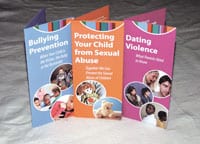Mass. Medical Society Physicians Target Youth Violence
WALTHAM — Physicians of the Mass. Medical Society have produced a series of 10 brochures to help parents identify and deal with a range of topics on youth violence, including bullying, dating and street violence, violence in the media, and child sexual abuse. They are available free to parents, educators, youth counselors, and others who work with children and youth.
Originated by Dr. Robert Sege and developed by the medical society’s Committee on Violence Intervention
and Prevention, the current publications are updated versions of a previous series and contain information from a variety of sources, such as the American Academy of Pediatrics and Massachusetts Citizens for Children. They are written by experts in the field of youth violence.
Dr. Elliot Pittel, chair of the society’s Committee on Violence Intervention and Prevention and a psychiatrist at the Home for Little Wanderers in Boston, called attention to the severity of the problem.
“Violence or abuse affecting children occurs in far too many places — in the home, at school, on the street, online, in relationships — and has enormous effects on physical and mental health, and we see the results all too often in headlines and news reports,” he said. “Physicians can play a major role in addressing the needs of hurt and injured children by screening for violence as an essential part of every visit to the doctor.”
Sege, who is director of the Division of Family and Child Advocacy at Boston Medical Center and professor of Pediatrics at Boston University School of Medicine, said the aim of these publications is “to reach beyond the physician’s office, to educate parents and those who care for children with expert, practical information, first to prevent violence, and then, when and if it does occur, to intervene appropriately. Parents and their children’s healthcare providers must be allies in trying to keep children safe.”
The series includes ten titles: Protecting Your Child From Sexual Abuse; When Children Witness Violence in the Home; Bullying Prevention: When Your Child Is the Victim, the Bully, or the Bystander; Street Violence: Your Child Has Been Hurt, What You Can Do; Dating Violence: What Parents Need To Know; Protecting Your Child from Gun Injury; Pulling the Plug on Media Violence; Some Myths and Facts About Violence; Time-Out! A Break from Negative Behavior; and Raise Your Child with Praise: Tips for Parents of 2- to 5-yearolds.
The brochures may be downloaded free of charge at www.massmed.org/ violence. Printed copies may be ordered individually or in sets from the Mass. Medical Society by writing to dph@ mms.org or calling (800) 322 2303, ext. 7373.
The publications are part of the society’s Campaign Against Violence, co-sponsored by the Mass. Medical Society Alliance.
Other materials in the effort are two guides for healthcare professionals, both also free via download from the society’s website:
Recognizing and Preventing Youth Violence, edited by Sege and Vincent Licenziato, provides basic information about youth violence for physicians and healthcare providers, describing risk factors and appropriate screening tools, as well as suggesting approaches to violence prevention and intervention. A PowerPoint presentation and lecture based on the guidebook are also available on the society’s website.
Intimate Partner Violence, written by Dr. Elaine Alpert, describes the role of the physician in screening and caring for patients at risk for domestic violence, spousal abuse, or battering. Physicians are often the first and sometimes the only professionals who see survivors of violence and are therefore able to play a crucial role in breaking the cycle of violence and working toward prevention.

